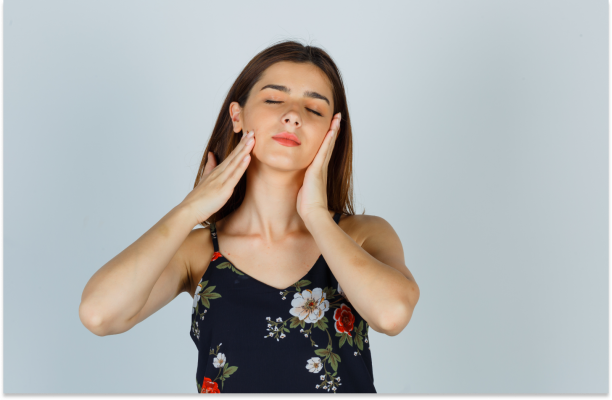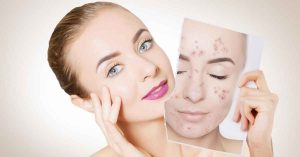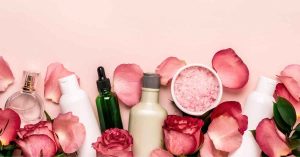Aging is inevitable, but with the right approach, we can minimize its visible effects and maintain youthful, glowing skin. As we age, skin starts to lose collagen, elasticity, and moisture, leading to fine lines, wrinkles, and a less vibrant complexion. While it’s not possible to completely stop aging, understanding the causes of aging skin and how to prevent premature signs can make a significant difference.
Here’s everything you need to know about slowing down the aging process and keeping your skin healthy and youthful.
1. Protect Your Skin from the Sun 
The sun’s harmful UV rays are the number one cause of premature aging. Prolonged exposure to UV rays leads to photoaging, which includes wrinkles, age spots, and an uneven skin tone. The ultraviolet radiation breaks down collagen in the skin, which is essential for maintaining skin structure and elasticity.
Tip: Always wear sunscreen with at least SPF 30+ daily, even on cloudy days. Sunscreen helps to block both UVA and UVB rays, which cause sunburns and deep skin damage. Don’t forget to apply sunscreen to all exposed areas, including your face, neck, and hands, and reapply every two hours, especially when outdoors. For extra protection, wear a wide-brimmed hat and sunglasses, and seek shade when the sun is at its peak between 10 a.m. and 4 p.m.
Learn more about the importance of sunscreen and sun safety on American Academy of Dermatology.
2. Stay Hydrated for Glowing Skin 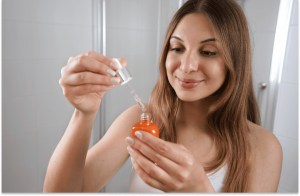
Water is essential for maintaining healthy, youthful skin. Dehydration can cause your skin to appear dry, flaky, and dull, which can accentuate wrinkles and fine lines. When your skin is hydrated, it remains plump, smooth, and radiant.
Tip: Aim to drink at least 8 glasses of water a day. Hydrating not only benefits your skin but also aids in digestion, circulation, and overall well-being. Additionally, you can increase your hydration by eating water-rich foods such as cucumbers, tomatoes, and watermelon, which also provide skin-loving nutrients.
3. Use Moisturizer Daily 
As we age, our skin loses moisture, which can lead to the development of fine lines and sagging. Moisturizing helps to lock in hydration and maintain skin elasticity, keeping it smooth and soft. A good moisturizer also acts as a barrier against environmental pollutants that can damage your skin.
Tip: Choose a moisturizer suited to your skin type and concerns. Look for products containing hyaluronic acid, which is known to attract and retain moisture, or ceramides, which help to restore the skin’s natural barrier. Apply moisturizer twice a day, once in the morning after cleansing and again at night to nourish your skin while you sleep.
4. Prioritize Sleep for Skin Repair 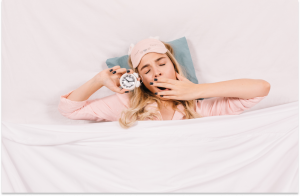
Beauty sleep is real! During the night, your skin enters its repair phase, working to heal itself and regenerate new cells. A lack of sleep can disrupt this process, resulting in dull skin, puffy eyes, and even dark circles. Chronic sleep deprivation also leads to increased stress levels, which can contribute to skin aging.
Tip: Aim for 7-9 hours of sleep each night. To improve the quality of your sleep, establish a consistent bedtime routine and avoid using electronic devices right before bed. You can also consider using a silk pillowcase, which reduces friction and helps prevent the formation of fine lines caused by pillow creases.
Check out this guide on how sleep impacts your skin at Sleep Foundation.
5. Retinoids: The Anti-Aging Miracle 
Retinoids, including retinol, are considered one of the most effective ingredients in the fight against aging. Retinoids accelerate skin cell turnover, promote collagen production, and reduce the appearance of wrinkles and fine lines. They also improve skin texture and tone.
Tip: Start using a retinol product in the evening, as retinol can make your skin sensitive to sunlight. Begin with a lower concentration (around 0.25% to 0.5%) and gradually increase as your skin builds tolerance. Pair retinol with your evening skincare routine after cleansing and before moisturizing. However, avoid using it if you’re pregnant or breastfeeding unless advised by a dermatologist.
Discover the best retinol products for anti-aging on Healthline.
6. Incorporate Anti-Aging Foods Into Your Diet 
What you eat plays a crucial role in your skin’s appearance. A balanced diet rich in antioxidants, vitamins, and healthy fats can nourish your skin from the inside out, protecting it from free radical damage that accelerates aging.
Tip: Include plenty of berries, avocados, leafy greens, and nuts in your diet. Berries are packed with antioxidants, which fight oxidative stress, while avocados are rich in healthy fats that keep your skin hydrated and plump. Salmon and other fatty fish are excellent sources of omega-3 fatty acids, which promote skin elasticity and hydration.
For more health and wellness tips, check out our Better & Healthy Blog on skincare and anti-aging foods.
7. Exercise for Healthy, Glowing Skin 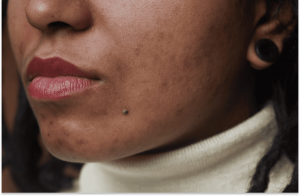
Exercise does more than just help you stay fit—it also promotes better skin health. Physical activity boosts circulation, delivering oxygen and essential nutrients to your skin. It also helps to eliminate toxins from the body, resulting in a clearer, brighter complexion.
Tip: Incorporate regular exercise into your routine, whether it’s walking, jogging, yoga, or strength training. Exercise also helps reduce stress, which, in turn, helps prevent skin problems like acne or inflammation. Make sure to cleanse your face after working out to remove sweat and bacteria from your pores.
8. Avoid Smoking and Limit Alcohol Consumption 
Smoking and excessive alcohol consumption are two habits that can accelerate the aging process. Smoking reduces blood flow to the skin, depriving it of the nutrients it needs to stay youthful, while alcohol dehydrates the skin and depletes collagen, leading to wrinkles and sagging.
Tip: If you’re a smoker, consider quitting to improve both your skin health and overall well-being. Limit alcohol intake to promote hydration and prevent dehydration-related skin issues.
Learn more about the negative effects of smoking on your skin at WebMD.
9. Manage Stress for Younger Skin 
Stress is one of the leading causes of premature aging. It triggers the release of cortisol, a hormone that can break down collagen and cause inflammation, leading to wrinkles and skin damage. Chronic stress can also result in skin conditions like acne and eczema.
Tip: Manage stress by practicing mindfulness, meditation, and deep-breathing exercises. Regular exercise and spending time in nature can also significantly reduce stress levels. Taking time for yourself to relax and unwind will help you feel more balanced and reduce the negative effects of stress on your skin.
10. Exfoliate Regularly to Reveal Fresh Skin 
Exfoliating helps to remove dead skin cells, allowing fresh, new cells to surface. This process promotes smoother, brighter skin and can also minimize the appearance of fine lines and age spots.
Tip: Use a gentle exfoliant with AHAs or BHAs once or twice a week. Avoid harsh scrubs, which can irritate the skin and cause more damage. Exfoliating at night before moisturizing allows your skin to absorb the active ingredients more effectively.
Conclusion: Embrace Aging Gracefully 
While aging is unavoidable, adopting healthy lifestyle habits can keep your skin looking youthful, vibrant, and beautiful for years to come. By protecting your skin from the sun, staying hydrated, getting enough sleep, and eating a nutrient-rich diet, you can help slow down the visible signs of aging and maintain a healthy, radiant complexion. Remember, the key to anti-aging is not about turning back the clock but taking proactive steps to keep your skin healthy and glowing at every stage of life.
Taking care of your skin is an investment in your overall health, so make it a priority and embrace aging with confidence and grace!

